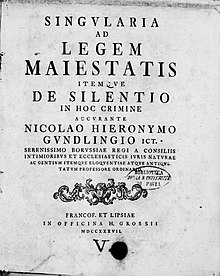Nicolaus Hieronymus Gundling

Nicolaus Hieronymus Gundling
Nicolaus Hieronymus Gundling (February 25, 1671 – December 9, 1729), was a German jurist and eclectic philosopher. He was born in Kirchensittenbach, and died in Magdeburg. He was the brother of Jacob Paul von Gundling, Court Historiographer to King Frederick I of Prussia, who became a figure of ridicule in the "Tobacco Cabinet" (Tabakskollegium) of Frederick William I.
Son of a pastor, Gundling studied in Altdorf, Jena, Leipzig and Halle. In 1702 he entered into controversy with , who had raised fears about the effect on German life of the French fashion for the novel.[1] In 1705 he became professor of philosophy at Halle, and in 1707 he became professor of jurisprudence there.[2]
Works[]

Singularia ad legem maiestatis itemque de silentio in hoc crimine, 1737
- Dissertatio de statu naturali Hobbesii, 1706
- Ioannes Casa an paiderastìas crimen defenderit, in: Observationes selectae ad rem litterariam spectantes, Renger, Halae 1707, vol. 1, pp. 120–136.
- Politica seu prudentia civilis ratione connexa, exemplis illustrata, 1732
- Ausführlicher Discours über den jetzigen Zustand der europäischen Staaten, 1733/4
- Singularia ad legem maiestatis itemque de silentio in hoc crimine (in Latin). Frankfurt am Main: Johann Heinrich Gross. 1737.
- Ius naturae ac gentium (in Latin). Genoa: sumptibus Antonii Philibert. 1751.
References[]
- ^ "The Novel in Europe 1670-1730". Archived from the original on 2011-06-05. Retrieved 2009-12-06.
- ^ Ahnert, Thomas (2006), "Gundling, Nicolaus Hieronymus", in Haakonssen, Knud (ed.), The Cambridge History of Eighteenth-Century Philosophy, 2, Cambridge University Press, p. 1176
External links[]
- Works by or about Nicolaus Hieronymus Gundling in libraries (WorldCat catalog)
Categories:
- 1671 births
- 1729 deaths
- Jurists from Bavaria
- German male writers
- German law biography stubs
- German philosopher stubs